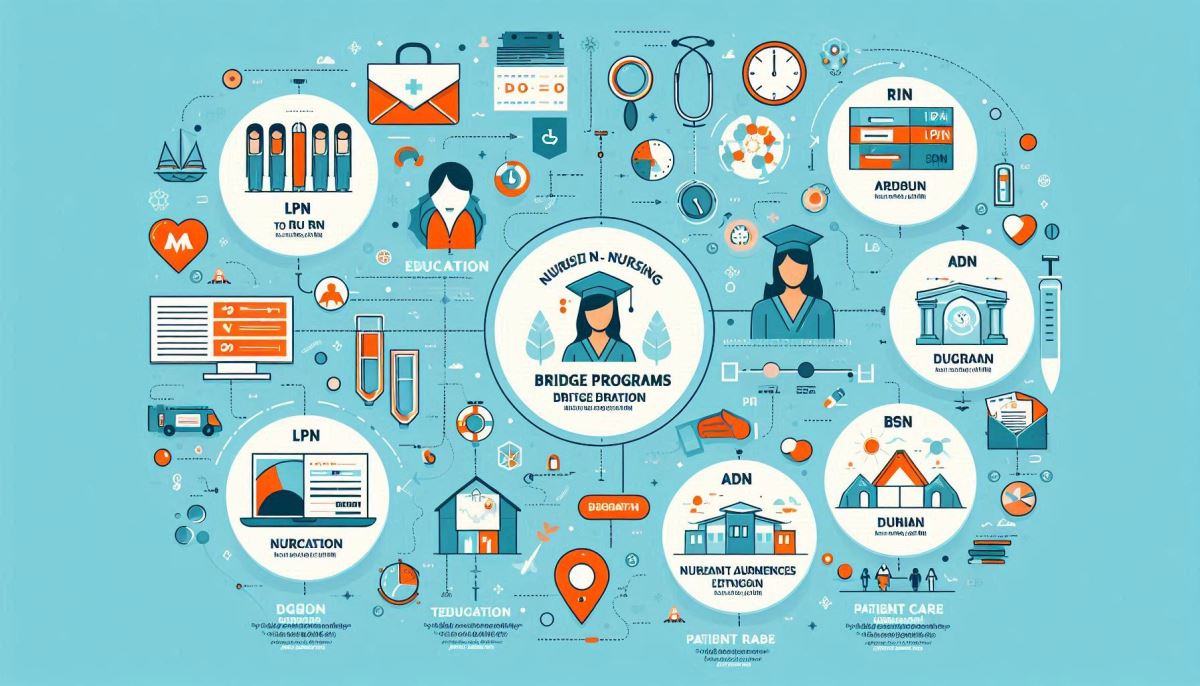Nursing bridge programs serve as a critical stepping stone for individuals seeking to elevate their nursing careers. These programs cater to licensed practical nurses (LPNs) and associate degree nurses (ADNs) looking to advance to registered nurse (RN) status or pursue higher education in nursing.
This article explores the various aspects of nursing bridge programs, including their types, benefits, application process, and frequently asked questions.
Understanding Nursing Bridge Programs
Nursing bridge programs are designed to facilitate a smooth transition for nurses who want to enhance their qualifications and skills. The two most common types of bridge programs are:
1. LPN to Registered Nursing Bridge Programs
These programs are tailored for licensed practical nurses who wish to become registered nurses. They often build upon the existing knowledge and experience of LPNs, allowing them to complete their RN education in a shorter time frame than traditional RN programs.
2. ADN to BSN Bridge Programs
These programs are aimed at associate degree nurses who wish to obtain a Bachelor of Science in Nursing (BSN). The BSN degree is increasingly recognized as essential for advanced nursing roles and leadership positions.
| Program Type | Target Audience | Duration | Degree Awarded |
|---|---|---|---|
| LPN to RN | Licensed Practical Nurses | 12-18 months | Associate’s or BSN |
| ADN to BSN | Associate Degree Nurses | 12-24 months | Bachelor of Science in Nursing |
Benefits of Nursing Bridge Programs
Accelerated Pathway
One of the main advantages of bridge programs is their accelerated nature. These programs are designed to recognize prior learning and experience, enabling students to graduate more quickly than they would in a traditional nursing program.
Career Advancement
Obtaining an RN or BSN opens doors to advanced nursing roles, including leadership positions, specialized clinical roles, and opportunities in education and research. Many healthcare employers prefer or require a BSN for certain positions.
Improved Patient Care
Higher education levels among nurses have been linked to better patient outcomes. Bridge programs help to enhance critical thinking, leadership skills, and clinical competencies, ultimately benefiting patient care.
Flexible Learning Options
Many bridge programs offer online or hybrid formats, allowing students to balance their education with work and personal commitments. This flexibility is particularly beneficial for working nurses.
Admission Requirements of Nursing Bridge Programs
Admission requirements for RN bridge programs can vary significantly depending on the institution. However, common prerequisites include:
- Valid Nursing License: LPNs must hold a current LPN license, and ADNs must be licensed as RNs.
- Transcripts: Applicants must provide transcripts from previous nursing programs and any other relevant coursework.
- Entrance Exams: Some programs may require standardized entrance exams such as the TEAS (Test of Essential Academic Skills).
- Letters of Recommendation: Many programs request letters of recommendation from employers or instructors.
Curriculum Overview
The curriculum in nursing bridge programs is designed to build upon the foundational knowledge gained during previous nursing education. Key topics often covered include:
- Advanced pharmacology
- Pathophysiology
- Nursing leadership and management
- Community health nursing
- Evidence-based practice
Students engage in both theoretical coursework and clinical practice, which helps to reinforce learning and prepare them for real-world nursing challenges.
Frequently Asked Questions (FAQ)
Conclusion
Nursing bridge programs provide an invaluable opportunity for LPNs and ADNs to advance their careers and enhance their skills.
With the growing demand for highly educated nurses in the healthcare field, these programs are becoming increasingly important.
By understanding the benefits, admission requirements, and the structure of these programs, aspiring nurses can make informed decisions about their educational pathways.




